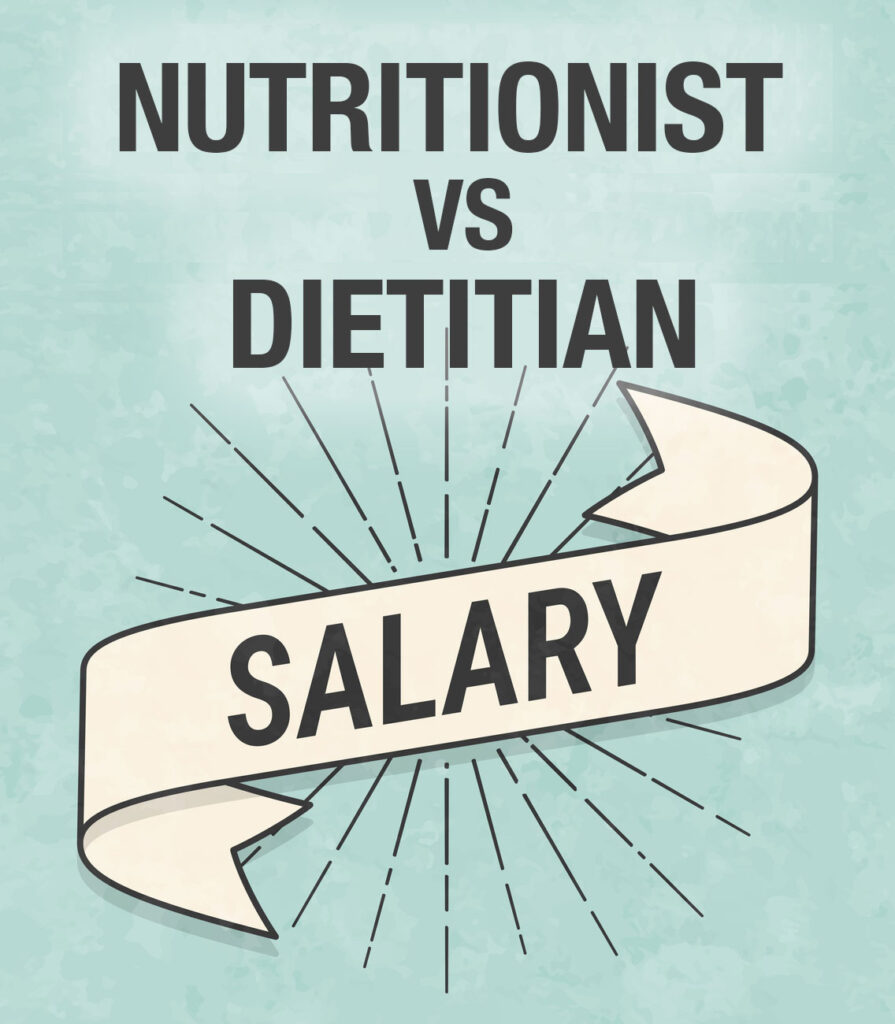
If you’re considering a career in nutrition, one of the first questions you may ask is: How much do nutritionists and dietitians make? While the terms are often used interchangeably, there are key differences in credentials, job duties, and—most importantly—salary. In this guide, we’ll explore how much each professional typically earns and why.
What’s the Difference Between a Nutritionist and a Dietitian?
Although both roles focus on health and diet, a Registered Dietitian Nutritionist (RDN) has formal training, a degree in dietetics, supervised practice, and a national exam under their belt. Most states require licensure for RDNs, and they’re often employed in clinical or medical settings. By contrast, the title “nutritionist” is less regulated and can refer to a wide range of professionals, from certified health coaches to community wellness educators. Also see our further in-depth article on Nutritionist vs Dietitian careers.
Nutritionist vs Dietitian: Salary Overview
The U.S. Bureau of Labor Statistics (BLS) combines nutritionists and dietitians into one category: Occupational Code 29-1031. As of May 2023, the reported median annual salary for this combined group is $69,350. However, this number doesn’t reflect the actual difference between RDNs and non-credentialed nutritionists in the real-world job market.
Average Salary for Registered Dietitians
Registered Dietitian Nutritionists (RDNs) generally command higher salaries because of their advanced qualifications and ability to work in hospitals, outpatient clinics, and insurance-billable environments. Here’s a breakdown based on BLS and job market data:
- Median salary: $69,350 per year
- Top 10% earners: Over $95,000 per year
- Common employers: Hospitals, long-term care facilities, schools, public health departments
Many RDNs also work in private practice or as consultants, which can raise earning potential significantly.
To become an RDN, you’ll need at least a bachelor’s degree (and a master’s for those entering the field after 2024), plus a supervised practice program. Learn more about how to become a Registered Dietitian online.
How Much Do Nutritionists Make?
Because the title “nutritionist” is not standardized across states, salaries vary widely based on education, certification, and job setting. Common roles include health coaches, nutrition consultants, wellness coordinators, and community educators. Most of these positions do not require licensure or RDN credentials.
Typical salary range for non-RDN nutritionists:
- Entry-level roles: $30,000–$45,000
- Experienced nutritionists or certified health coaches: $45,000–$60,000
- Private consultants or entrepreneurs: Varies widely, potential to earn six figures
Learn more about nutritionist certification options and how they impact job prospects and pay.
Factors That Influence Salary
Whether you choose to become a dietitian or a nutritionist, your earning potential will depend on several factors:
- Education level: Advanced degrees often lead to higher-paying roles
- Location: Urban areas and certain states (like California and New York) pay more
- Experience: Senior-level practitioners earn more across the board
- Work setting: Clinical and government roles typically pay more than nonprofit or community jobs
- Credentials: Holding an RDN or board certification boosts credibility and salary
Can Nutritionists Earn as Much as Dietitians?
In some cases, yes—but it depends. Nutritionists working in private practice, corporate wellness, or online platforms may out-earn entry-level dietitians, especially if they build a strong personal brand or business. However, in traditional healthcare and clinical settings, RDNs tend to have higher average salaries due to credentialing, licensure, and medical billing capabilities.
Which Career Has Better Long-Term Earning Potential?
For those interested in clinical work, hospital settings, or working with insurance reimbursement, becoming a Registered Dietitian offers greater long-term income security and advancement potential. If you’re more entrepreneurial, a nutritionist career can still be lucrative, especially when paired with specialized certifications or niche services like sports nutrition or functional wellness.
Conclusion: Which Path Should You Choose?
If your goal is to work in clinical nutrition, hospitals, or public health—becoming an RDN is the best choice for salary and stability. But if you’re drawn to holistic health, wellness coaching, or self-employment, a career as a certified nutritionist may offer more freedom and flexibility.
Still unsure which path is right for you? Check out our complete guide on how to become a nutritionist and start comparing education programs, credentials, and state requirements.
FAQs
- Does BLS report separate salary data for dietitians and nutritionists? — No. The BLS combines them under one occupation code, which can mask real-world salary differences.
- Can a nutritionist earn more than a dietitian? — Yes, especially in private practice or corporate wellness roles. But RDNs typically earn more in clinical settings.
- Is it worth it to become an RDN? — If you’re seeking clinical roles, higher salary ceilings, and insurance reimbursement opportunities, then yes.







